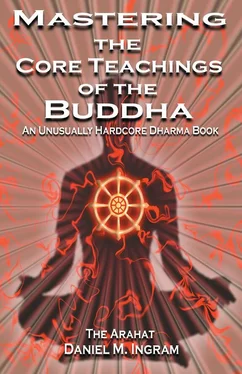Daniel Ingram - Mastering the Core Teachings of Buddha - An Unusually Hardcore Dharma Book
Здесь есть возможность читать онлайн «Daniel Ingram - Mastering the Core Teachings of Buddha - An Unusually Hardcore Dharma Book» весь текст электронной книги совершенно бесплатно (целиком полную версию без сокращений). В некоторых случаях можно слушать аудио, скачать через торрент в формате fb2 и присутствует краткое содержание. Год выпуска: 2009, ISBN: 2009, Издательство: Aeon Books, Жанр: Старинная литература, на русском языке. Описание произведения, (предисловие) а так же отзывы посетителей доступны на портале библиотеки ЛибКат.
- Название:Mastering the Core Teachings of Buddha - An Unusually Hardcore Dharma Book
- Автор:
- Издательство:Aeon Books
- Жанр:
- Год:2009
- ISBN:9781904658405
- Рейтинг книги:5 / 5. Голосов: 1
-
Избранное:Добавить в избранное
- Отзывы:
-
Ваша оценка:
- 100
- 1
- 2
- 3
- 4
- 5
Mastering the Core Teachings of Buddha - An Unusually Hardcore Dharma Book: краткое содержание, описание и аннотация
Предлагаем к чтению аннотацию, описание, краткое содержание или предисловие (зависит от того, что написал сам автор книги «Mastering the Core Teachings of Buddha - An Unusually Hardcore Dharma Book»). Если вы не нашли необходимую информацию о книге — напишите в комментариях, мы постараемся отыскать её.
Mastering the Core Teachings of Buddha - An Unusually Hardcore Dharma Book — читать онлайн бесплатно полную книгу (весь текст) целиком
Ниже представлен текст книги, разбитый по страницам. Система сохранения места последней прочитанной страницы, позволяет с удобством читать онлайн бесплатно книгу «Mastering the Core Teachings of Buddha - An Unusually Hardcore Dharma Book», без необходимости каждый раз заново искать на чём Вы остановились. Поставьте закладку, и сможете в любой момент перейти на страницу, на которой закончили чтение.
Интервал:
Закладка:
Now, it is true that the battle is not always to the strong, nor the race to the swift, but that’s the way to bet. In other words, those who do lots of practice in daily life, go on more and longer retreats, are more consistently able to concentrate and investigate quickly and precisely, pay attention more often during their daily activities, and have their 68
Practical Meditation Considerations
morality trip more together are, on average, much more likely to make progress.
When on retreat, people have the opportunity to practice nearly all day in settings that are usually designed to be very conducive to clear, precise inquiry and depths of meditation. (Why so few people actually take advantage of these circumstances when they go on retreat is beyond me, and I will spend some time ranting about that later.) The point is that going on retreats can give opportunities for much faster and deeper practice to those who choose to really practice. Said another way, if you go on retreat, make good use of that time.
There is a huge difference between the experiences of people who do retreats halfway and people who really follow the instructions all day long. In my experience, there is no comparison between retreats I have done when I really powered the investigation from the time I awoke until I went to sleep at night, causing fast and profound progress, and when I took breaks here and there to think about things such as my issues and meditation theory, generally causing moderate to slow progress. While many people think that retreats are for more advanced practitioners, I think that a few retreats early in one’s practice can really jump start things, allowing one to then make much better use of meditation time off retreat.
I often think of the momentum that retreats generate in terms of rolling a boulder over a hill. If you get a long running start, pushing hard the whole way, you are more likely to be able to get the boulder rolling fast enough so that it rolls over the hill in one straight shot. If you push intermittently or half-heartedly, the boulder is likely to roll back when you get to the steep part of the hill, but you have worn the hill down a little bit, and you may also be a bit stronger for the exercise. Thus, it is possible to wear down the hill given enough time, but it is much faster to simply power over it the first time and move on to the next hill. I know of no obvious benefits from slow practice that fails to gain some footholds in the territory of concentration or insight.
Those who take the wear down the hill approach may eventually lose faith and interest, having done lots of work to little effect. Those who really apply themselves and cross a few hills early on through focused and consistent effort, such as retreats or really solid daily life 69
Practical Meditation Considerations
practice, will have more of a sense of accomplishment and
empowerment, and may have even put in less total time and effort than those who tried to wear down the hill. This irony should not be lost on those who want to be smart about developing their meditative skills.
For example, lets say that you could allocate 365 hours out of one year to formal meditation practice. Given a choice, I would be more inclined to take half of those hours, about 182, and do a 10 day retreat practicing hard and consistently 18 hours a day with minimal breaks at the beginning of the year, and then spend half an hour meditating each of the other days. I would be much more likely to cross into some interesting territory early on and overcome some of the initial hurdles than if I spent one hour each day for that year practicing well. The amount of time and effort is the same, but the effect is likely to be quite different.
A few odds and ends about retreats. First, retreats tend to have a semi-predictable rhythm to them. Realizing this allows us, if we have the time and resources to space, to choose how long a retreat we want to meet our meditative goals. Even if we are practicing well, the first few days of a retreat tend to be mostly about adjusting to the place, the posture, the routine, the people, the local customs, the schedule, etc.
Similarly, the last day or two of a retreat tends to bring up thoughts of what we are going to do next. Thus, to give yourself some time in the middle when you are not dealing with these things as much, I recommend greater than 5-day retreats when possible. It is not that benefit can’t be derived from shorter retreats, but there is something about those middle days that tends to make strong concentration and good practice easier to attain.
Second, every retreat center and tradition has its neurotic shadow aspects and downsides. This is inevitable, but by identifying them and realizing that there are ways to have them not slow our investigation down is helpful. One center where I have spent a bit of time is prone to attracting very serious, scowling people who trudge around in their walking practice like the slightest sound or glance from anyone around them might set them off like a bomb. I have been to another center where sometimes I have been the only meditator there, requiring me to have more self motivation and discipline. Another monastic center I 70
Practical Meditation Considerations
have been to has the whole male hierarchy thing going which can cause all sorts of reactions from retreatants both female and male.
Then there are basically always neurotic things around food (huge topic, of which vegetarian vs. non-vegetarian is just the tip of the iceberg), bathrooms, quarters, showers, hot water, washing clothes and dishes, cleaning duties, heating and cooling (one place I have been to has cantankerous wood stoves in some buildings for heat, another in a tropical setting has open windows that let the mosquitoes swarm in), clothing (e.g. some centers have people wear white, others won’t tolerate skimpy or revealing outfits, some don’t care), fragrances, chemical sensitivities, incense, morning wake-up bells (too quiet, too loud, someone forgets to ring it at all), schedules, roommates (particularly those that snore, smell, are noisy or messy, etc.), strictness of silence, eye contact or the lack thereof, etiquette around teachers (e.g. to bow or not, to ask challenging questions or not, limits on the time we have access to them, their personalities and neurotic stuff, whether or not they speak the language we speak, etc.), etiquette of entering rooms with icons (e.g. whether to bow three times or not), the presence of icons or not (and which icons), and issues of the orthodoxy of ritual, dogma, posture, hand position, eating rituals, chanting, vows, etc.
This list doesn’t include issues of corruption, romances, cults of personality, affairs, crushes, miscommunications, vendettas, scandals, drug use, money issues, and all the other things that can sometimes show up anywhere there are people. In short, whatever you imagine that you or other people might have issues around, these are bound to show up sooner or later if you spend enough time in spiritual circles or retreat centers. While solo practice is an option, that doesn’t get you away from all of these issues and has its own set of downsides.
The crucial thing is to realize that great practice can occur in conditions far from perfect, particularly if we realize that all the sensations that make up these inputs and our reactions to them are all worthy of investigation and thus as much a source of ultimate and often relative wisdom as any other sensations. I have rarely had what I considered perfect practice conditions, but I have done well and you can also. That said, some centers, particular retreats, and teachers are better than others, and it is worth exploring and asking around. All these 71
Practical Meditation Considerations
things can be particularly distracting and distressing for a first time retreatant, as often there are some naïve hopes, however
Читать дальшеИнтервал:
Закладка:
Похожие книги на «Mastering the Core Teachings of Buddha - An Unusually Hardcore Dharma Book»
Представляем Вашему вниманию похожие книги на «Mastering the Core Teachings of Buddha - An Unusually Hardcore Dharma Book» списком для выбора. Мы отобрали схожую по названию и смыслу литературу в надежде предоставить читателям больше вариантов отыскать новые, интересные, ещё непрочитанные произведения.
Обсуждение, отзывы о книге «Mastering the Core Teachings of Buddha - An Unusually Hardcore Dharma Book» и просто собственные мнения читателей. Оставьте ваши комментарии, напишите, что Вы думаете о произведении, его смысле или главных героях. Укажите что конкретно понравилось, а что нет, и почему Вы так считаете.












